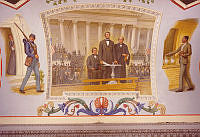Rubenstein Center Scholarship
The American Colonization Society
This article is part of the Slavery in the President’s Neighborhood initiative. Explore the Timeline
In the late eighteenth century, the original thirteen colonies dissolved and formed the United States. In 1787, delegates to the Constitutional Convention gathered in Philadelphia to craft a new federal government for the nation. The new Constitution protected the institution of slavery to fulfill an immediate and important need for a labor force, and preserved the hierarchy that kept white, male landowners at the helm of the leadership of the young country. While the Constitution ensured that slavery would be an integral part of the nation’s economy, political leaders and enslavers worried about the growing free Black population in their respective states. Many feared that free Black people would encourage and aid the enslaved population to rebel. They sought a solution that would remove this threat to the institution of slavery but would not create economic disruption.1
A series of insurrections and rebellions sparked new debates over slavery and emancipation, as well as colonization. The Haitian Revolution and the emergence of an independent Haiti created an atmosphere of fear and terror in the white population of the United States. In August 1791, enslaved and free people of color across the colony of Saint Domingue fomented a revolt and seized control of the colony from the colonial power of France. Declaring independence on January 1, 1804, the new republic of Haiti became the world’s first Black republic and the first independent nation in the Caribbean. The Haitian Revolution is also the only successful attempt where enslaved people liberated themselves from a colonial power in the western hemisphere.2 Many enslavers and supporters of slavery in the United States heard how free people of color participated and fought alongside the enslaved in the Haitian Revolution. These reports reinforced their shared belief that free Black people were an active threat to the institution of slavery and needed to be separated from the rest of the country’s population.3
In 1800, officials in Richmond uncovered plans for an insurrection led by an enslaved person, Gabriel, suggesting that the Haitian Revolution encouraged other enslaved people to rise up against their enslavers.4 Both the Haitian Revolution and Gabriel’s Rebellion prompted white leaders to take precautions to prevent a race war from breaking out in the state. Virginia passed laws creating tighter restrictions on or outright prohibiting emancipation, while legislation in Maryland, Delaware, Kentucky, and Missouri policed and restricted the movement of enslaved and free Black people.5 State legislatures and other leaders in white communities debated how to manage or remove the free Black population, as they feared this group would inspire enslaved people to revolt and assist their attempts to escape.

This print depicts Toussaint-L'Ouverture, leader of the Haitian Revolution, holding Haiti's Constitution of 1801 before God and his countrymen.
Library of CongressAs word of enslaved-led insurrections around the globe began to spread, enslavers and other leaders attempted to control the free Black population with new restrictions and codes. The restrictions also led many white leaders to consider colonization to rid the U.S. of free Black people. Through colonization, the free Black population would be settled in their own nation, eliminating the group of people deemed an imminent threat to the institution of slavery.6 A few proponents of colonization initially suggested the creation of a colony for Black people west of the Mississippi or the West Indies. But after Paul Cuffe, a mixed race Quaker, ship builder, and activist, made a successful, self-financed trip with thirty-eight Black people to Sierra Leone for the purpose of settling other free Black people in 1815, other supporters of colonization deemed the western coast of Africa the ideal location for a new colony.7 The perceived success of Cuffe’s voyage, along with the desire to remove free Black people from the United States altogether, served as the inspiration for the American Colonization Society.
Originally known as the American Society for Colonizing the Free People of Color of the United States, the American Colonization Society (ACS) was founded in 1816 by a group of white elites including Reverend Robert Finley, Charles Fenton Mercer, Henry Clay, Daniel Webster, Bushrod Washington, Elias Caldwell, and Francis Scott Key.8 Formed to assist in the colonization and removal of free Black people, the ACS quickly recruited support and financial backing from enslavers, the Protestant and Presbyterian churches, and others, including the federal government officials.9
While the ACS had been founded with primarily proslavery motivations, the origins of the organization also suggest a commitment, albeit loose, to abolitionist beliefs. As a result, the members of ACS were an unusual mix of abolitionists and enslavers—two groups that typically opposed each other. While they had very different primary goals, they agreed that free Black people would never be accepted as equals in the United States. Abolitionist-leaning members believed it was an opportunity for African Americans to escape racism, start their lives anew, and form their own nation where they could enjoy liberation and citizenship. It also removed the challenges integration would place on white people. Pro-slavery supporters considered it a means to remove those who might threaten slavery.10 Colonization was considered a somewhat progressive measure for the time, receiving support from people on both sides of the debate over slavery and abolition. While members had many motivations for joining the ACS and different opinions on the issue of slavery, the underlying belief that whites and Black people could not peacefully co-exist in society held this unorthodox group together for decades.11

Image of the American Colonization Society membership certificate of President James Madison. Madison served as the 3rd president of the Society.
Library of CongressAs the ACS grew, the organization sought to create and settle a colony in West Africa to fulfill its mission. In early 1820, the first group of emigrants, numbering around eighty-six people, set sail for West Africa. Because many of the emigrants fell ill with “African fever” and the rainy season impacted travel to the coast, this trip was not as successful as supporters hoped. To avoid a repeat of these issues, the ACS and its agents decided to send future groups during a different time of year.12 In 1821, the next group of emigrants and ACS agents traveled to West Africa, stopping in Sierra Leone to search for a suitable colony to purchase and settle. In December, the ACS purchased land along the West African coast for settlement and created the colony of Montserado, later known as Liberia. The capital in the colony was later named Monrovia in honor of President James Monroe, an ardent supporter of the ACS.13 Click here to learn more about the enslaved households of President James Monroe.
From the founding of the organization, many people across the country supported the ACS and the idea of colonization, including many powerful government officials. President Thomas Jefferson was an early supporter of the colonization movement. During his time in the White House, he and Governor James Monroe corresponded about their ideas for moving the free Black population out of Virginia. His treatise, Notes on the State of Virginia, which covered topics including a plan for emancipation and colonization of freed Black people, likely influenced Governor Monroe’s push for emancipation and colonization laws in Virginia after Gabriel’s Rebellion.14 President Jefferson even contacted the American Minister to Great Britain, Rufus King, to inquire about setting up a colony in the British colony of Sierra Leone—which the British ultimately rejected.15 Jefferson’s ideas and support for colonization offered crucial early backing for the ACS and encouraged other notable members to join the organization. Click here to learn more about the enslaved households of President Thomas Jefferson.
President James Madison was also a strong supporter of the ACS. He was elected the third president of the organization in 1833 and served until his death in 1836.16 President Madison, like President Jefferson, was an early advocate for colonization and developed his own ideas about how the process should work. In an 1819 letter, President Madison stated, “the freed blacks ought to be permanently removed beyond the region occupied by or allotted to a White population,” a belief held by some of his peers of that period.17 President Madison also argued for emancipation to be gradual and equitable to all involved, even stating that “the consent of both the Master & the slave should be obtained.”18 Although President Madison supported colonization and disagreed with the practice of slavery, he never emancipated his enslaved laborers during his lifetime or after his death, nor did he offer them the opportunity to emigrate to Liberia.19 Click here to learn more about the enslaved households of President James Madison.

Map of Liberia, 1845
Library of CongressWhile President Madison was not an outspoken supporter of the ACS until after his presidency, he provided significant financial support. Upon his death, he willed his enslaved laborers to his wife, Dolley, and left $2,000 to the ACS. The money for the ACS was to come from the selling of his papers, also left to Dolley Madison, which the federal government ended up publishing after debating the government’s affiliation with the ACS.20 While President Madison never participated in the colonization process because he did not want to send free Black people to Liberia without their consent, he bequeathed considerable financial support for the ACS so the organization could continue its work.21
Like his immediate predecessors, President James Monroe was a supporter of colonization and the ACS. During his tenure as governor, Monroe played an active role in the movement to punish formerly enslaved Black people who supported or actively participated in enslaved-led uprisings by transporting them outside of Virginia. He later pushed colonization as a solution to deal with the free Black community that terrified the white, landowning, and enslaving population.22 While not explicitly active with the main chapter of the organization during his presidency, President Monroe did use his influence and power in the White House to help the ACS obtain the necessary authority to carry out its early voyages.
President Monroe was primarily motivated by his desire to preserve the Union by removing any threats to its future, which benefited the ACS. During his presidency, President Monroe became close friends with ACS co-founder Charles Fenton Mercer, a former member of the Virginia General Assembly. Upon Mercer’s transition to Congress, the two worked together to push for colonization on a national level by passing legislation that aided ACS’s efforts. In early 1819, Mercer introduced a bill that would amend the 1807 law banning American participation in the African slave trade. The new provisions called for the United States Navy to patrol the African coast and intercept any slave ships, and required the president to return the Africans on the ship. The Navy would also provide agents on the coast that would assist with the resettlement of these Africans and other freed people. After Congress passed the bill, President Monroe signed it into law in March 1819.23 Because of Mercer’s connection to the ACS, the organization nominated delegates who served as agents on the African coast and used funds appropriated in the bill to agents to buy land for a settlement.24

This ACS pamphlet, meant to encourage emigration to Liberia, answers frequently asked questions about life in Africa.
Library of CongressPresident Monroe could not explicitly endorse the ACS while in office, but he found other ways to support the organization. President Monroe worked to suppress the slave trade and even provided some private financial support to the colony of Liberia. To honor Monroe, the ACS passed a resolution in 1824 that renamed Liberia’s capital after him.25 After his presidency ended, Monroe became more open in his support of colonization and the ACS, serving as president of an auxiliary chapter of the ACS and, later, vice president of the Colonization Society of Virginia.26 Like his predecessors, President Monroe never participated in colonization by emancipating his enslaved laborers and sending them to Liberia, despite his belief that slavery was “unjust and a detriment to the United States.”27
Even though he is known as a champion for emancipation and freedom for Black people, President Abraham Lincoln also endorsed colonization earlier in his life and even during his presidency. He believed that Black and white people could not coexist after emancipation and supported sending freed Black people to Liberia or Central America.28 On August 14, 1862, President Lincoln invited a group of prominent Black leaders to the White House to discuss colonization. He argued that Black and white people were not capable of living together in the United States and that it was unfair to both groups to have to suffer in the other’s presence.29 During the Civil War, Lincoln engaged in more dialogue with Black leaders and his views on emancipation and colonization evolved to those he expressed later in his presidency. Click here to learn more about the household of President Abraham Lincoln.
In spite of strong support for the ACS and its mission, the organization and its efforts failed because of opposition from the free Black community and its leaders. Much of the free Black community, particularly those in northern states, felt they were American citizens by birth and had no interest in leaving their homeland to live in a place they did not know or feel connected to in any meaningful way.30 As a result, few free Black people willingly traveled to the colony of Liberia, and over time, the number of emigrants decreased from 11,420 in 1830 to 7,836 by 1852.31

Letter from R.R. Gurley, Secretary of the American Colonization Society, to James Madison congratulating him on his unanimous election to president of the American Colonization Society.
Library of CongressThe emigrants also dealt with severe challenges upon their arrival in Liberia and the poor living conditions in the colony deterred other free Black people from settling in the colony.32 The settlers suffered from a high mortality rate and faced hostility from the indigenous peoples who tried to defend their homeland from colonizers.33 The ACS’s efforts to receive funding from state and federal governments, as well as private donors, also deteriorated as reports from Liberia revealed difficulties in settling the land. These reports also undermined interest from the free Black community and created additional funding problems for the colony. The ACS also lacked the funding to successfully support multiple voyages to and from Liberia, and to maintain and protect the colony. Despite having significant private and public backing at the local and national levels at the beginning, the ACS and colonization were not sustainable ideas. After Liberia gained its independence in 1847, the organization further stagnated and the American Colonization Society formally dissolved in 1964.34
In theory, colonization appeared to be an ideal solution to complicated and intertwined problems involving slavery, race relations, and the preservation of the Union. Many members of the American Colonization Society viewed their efforts as benevolent, but they gave little consideration to the opinions of free African Americans or how these measures would impact individuals, families, and communities of color. Colonization became a convenient alternative to emancipation, justifying the removal of a group of people deemed inferior while avoiding a direct confrontation with the institution of slavery and the large-scale manumission of enslaved people.
Instead, colonization exacerbated existing racial tensions, which led to the ACS’s demise. Many enslavers and those who benefited from the labor of enslaved people did not want to give up their labor force and advocates for colonization struggled to convince them to participate in the ACS’s efforts. Enslavers were not interested in emancipation, and few were willing to free the enslaved and provide their transportation to Africa. Those who initially supported the efforts of colonization in the free Black community, like businessman James Forten, eventually turned against the ACS and supported the efforts of abolitionists, like William Lloyd Garrison, who fought against colonization.35 Garrison and others eventually realized that their collaboration with enslavers was only fortifying the institution of slavery. As a result, the ACS imparted a legacy that the two races could never live peacefully side by side. Supporters, both abolitionists and enslavers, agreed that Blackness was inferior and required removal “in Order to form a more perfect Union.”36










